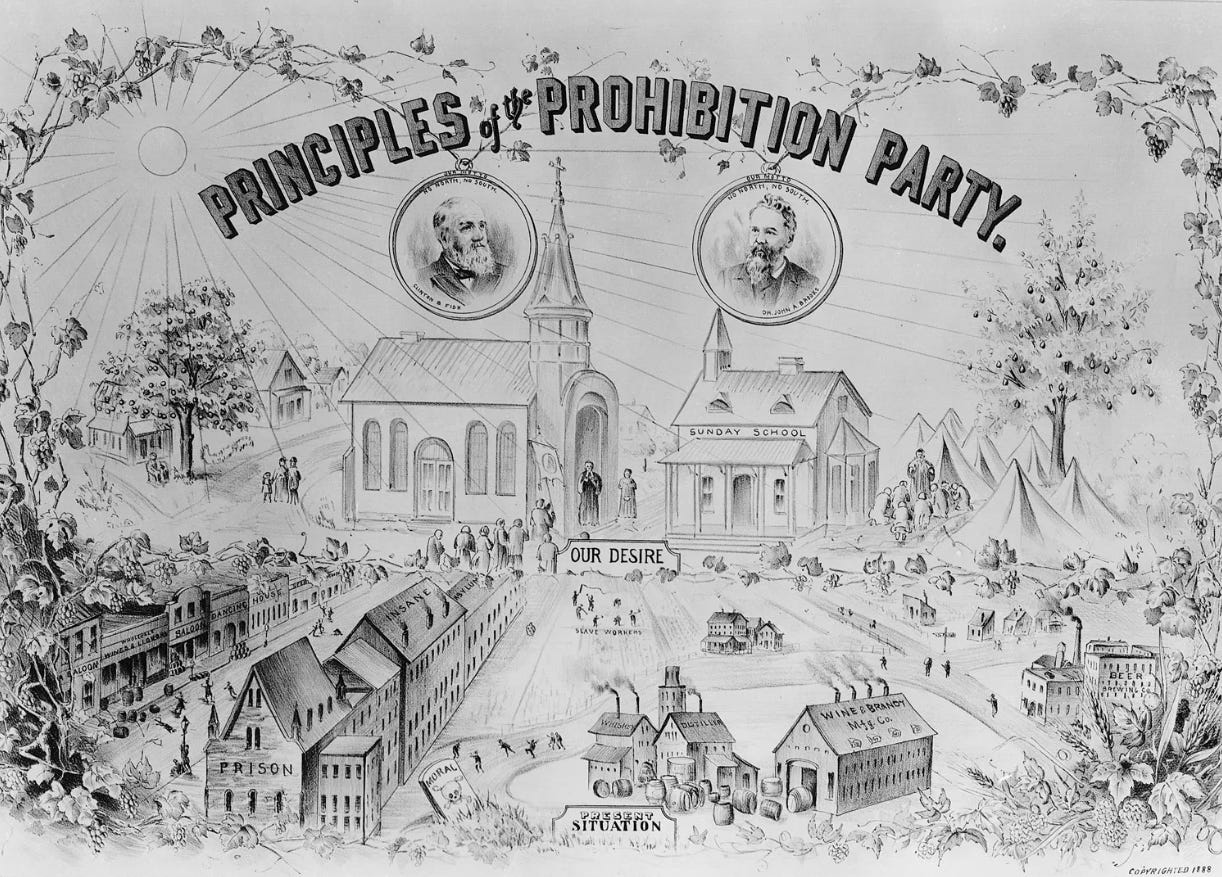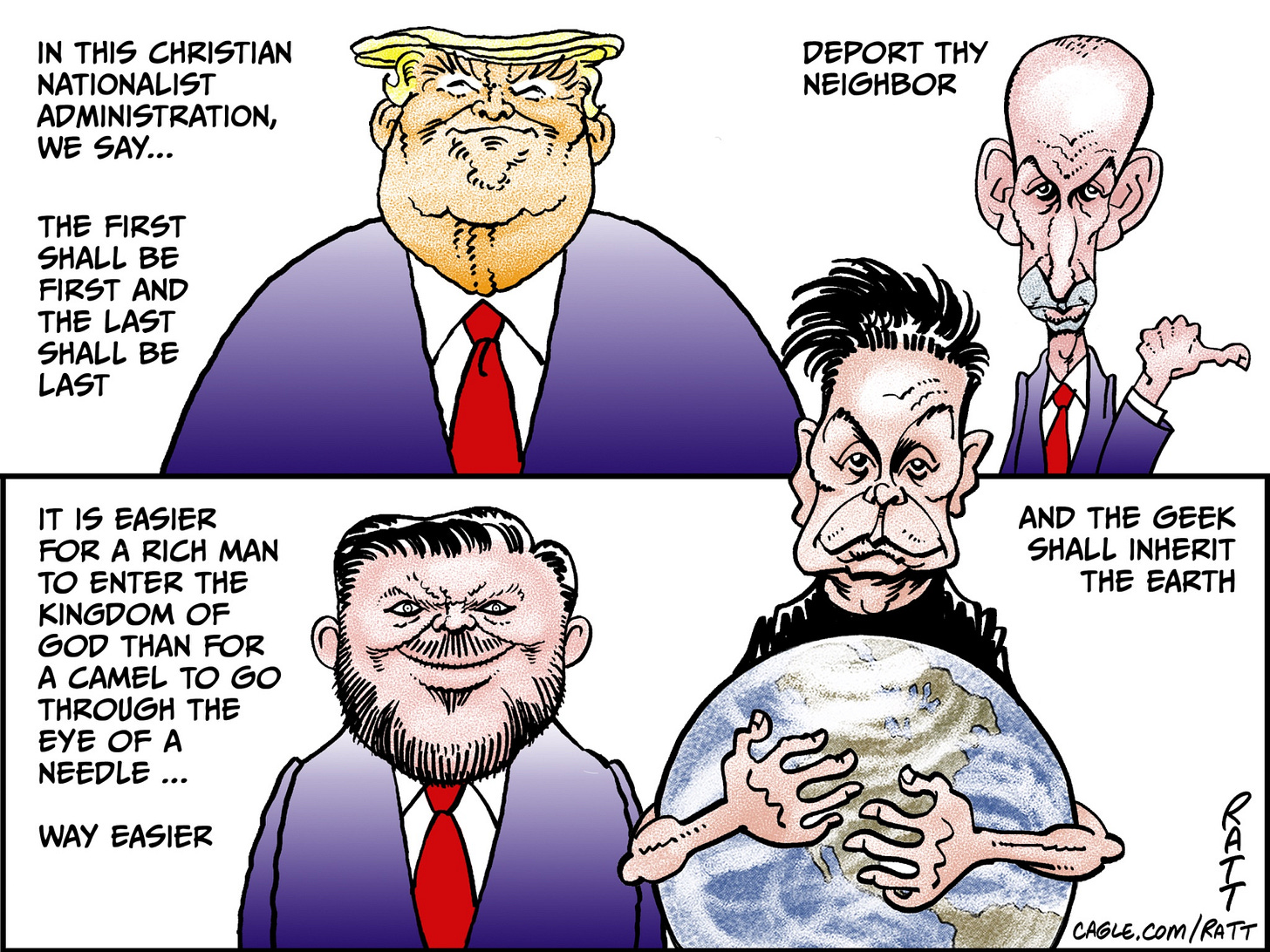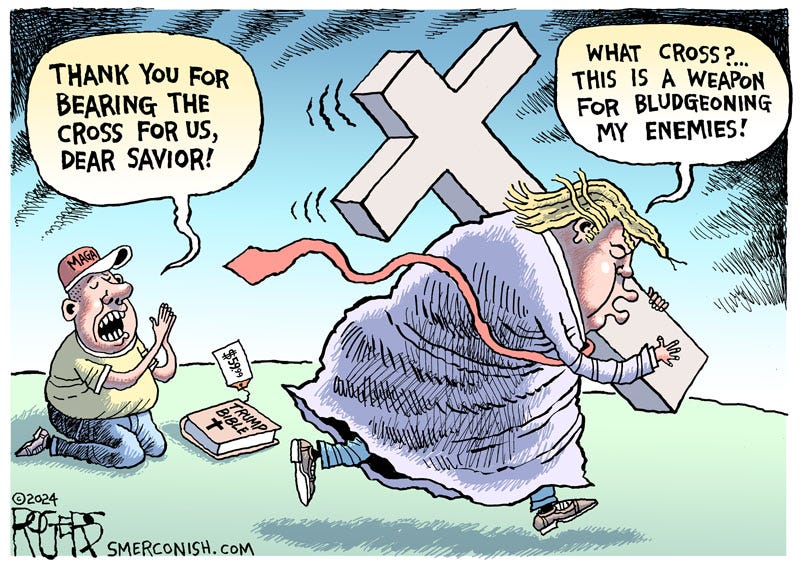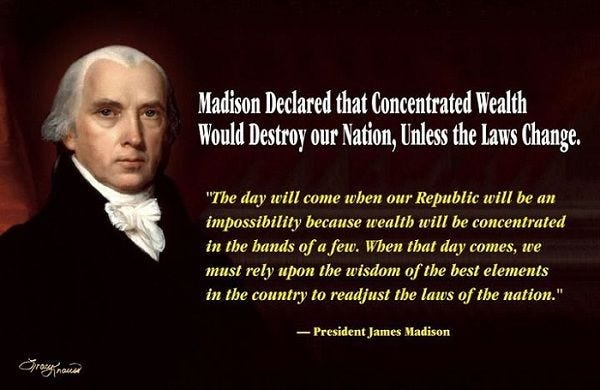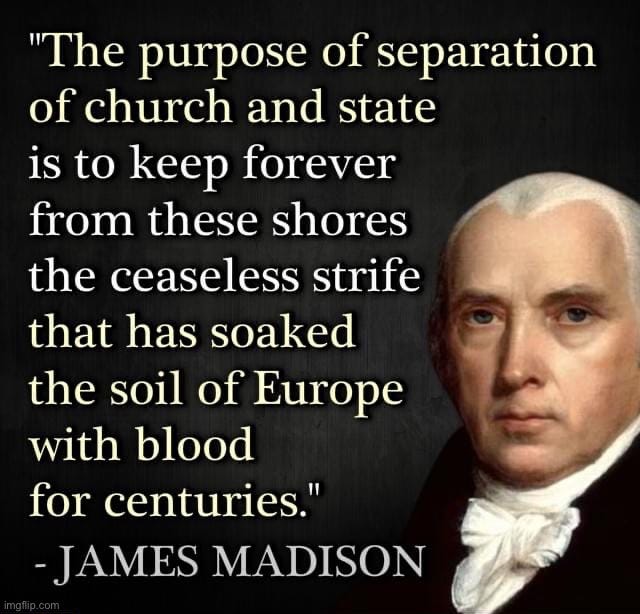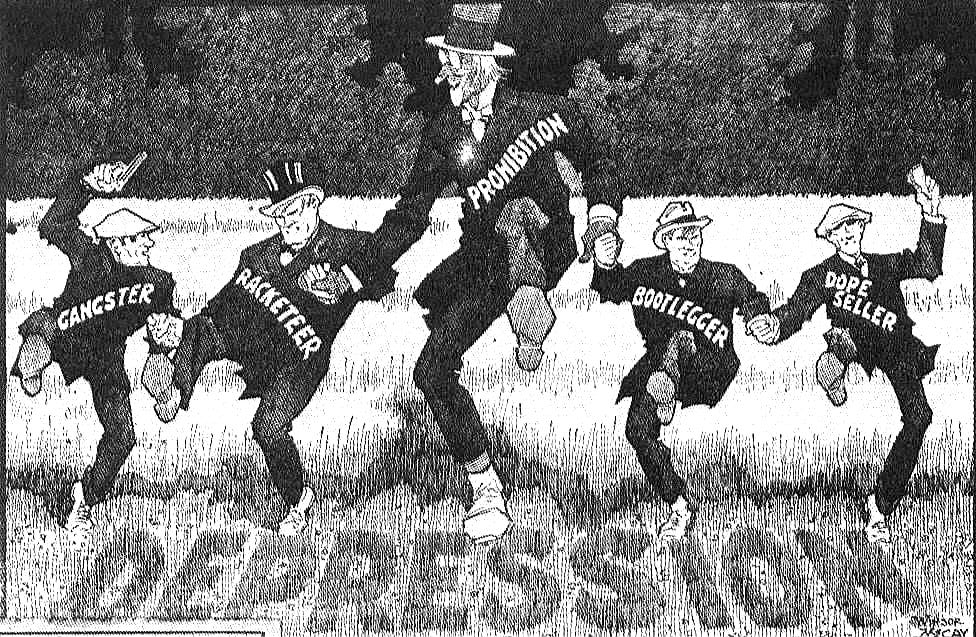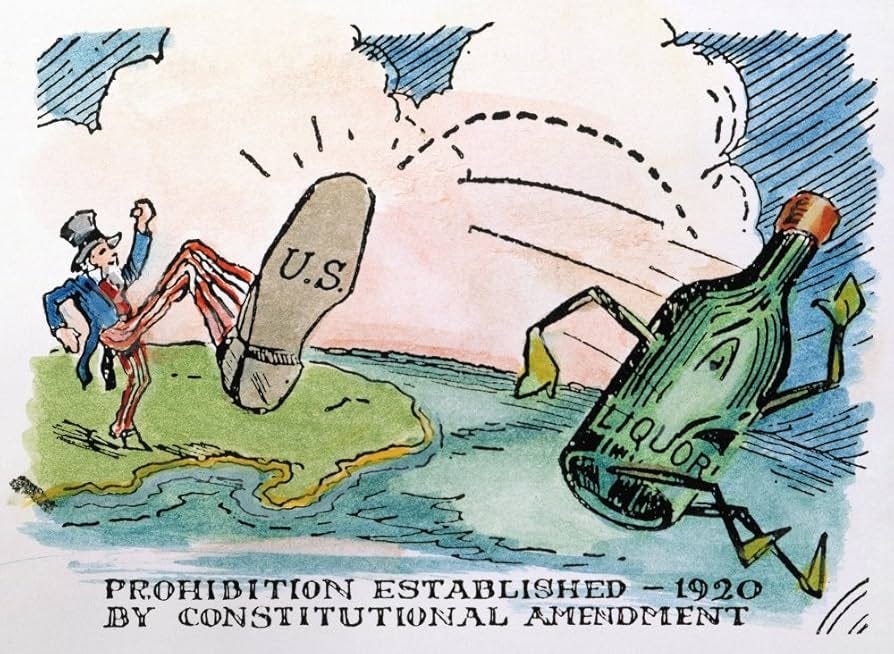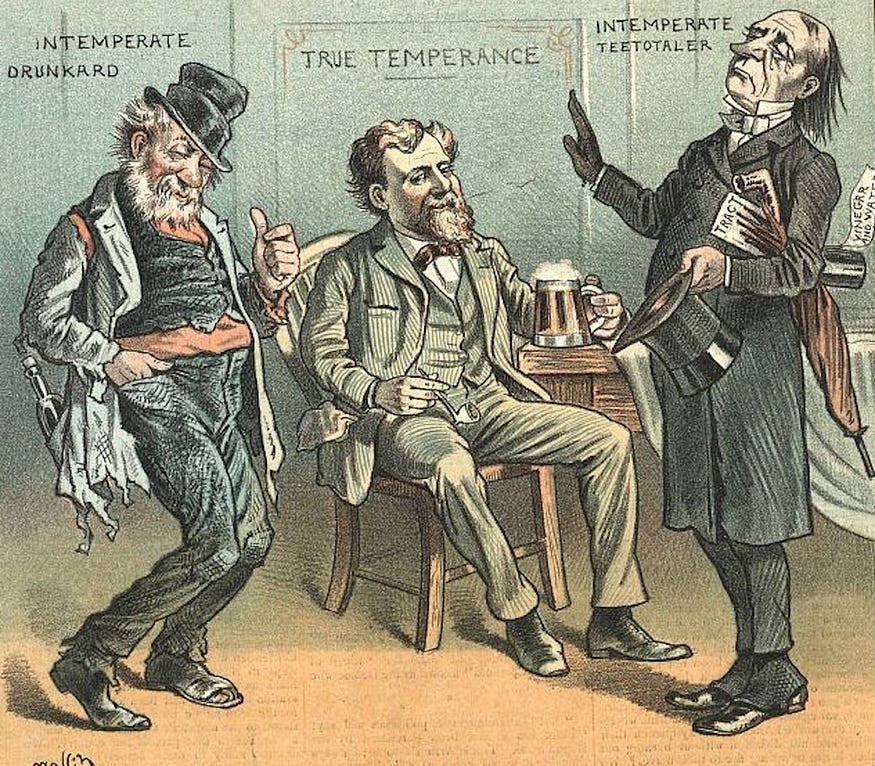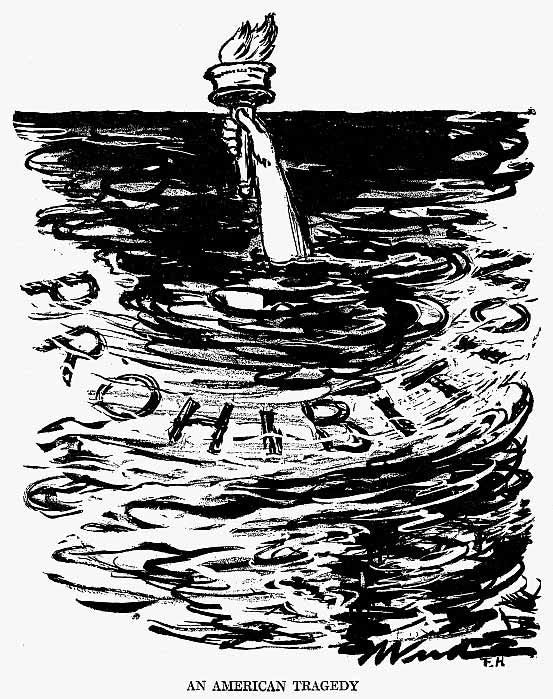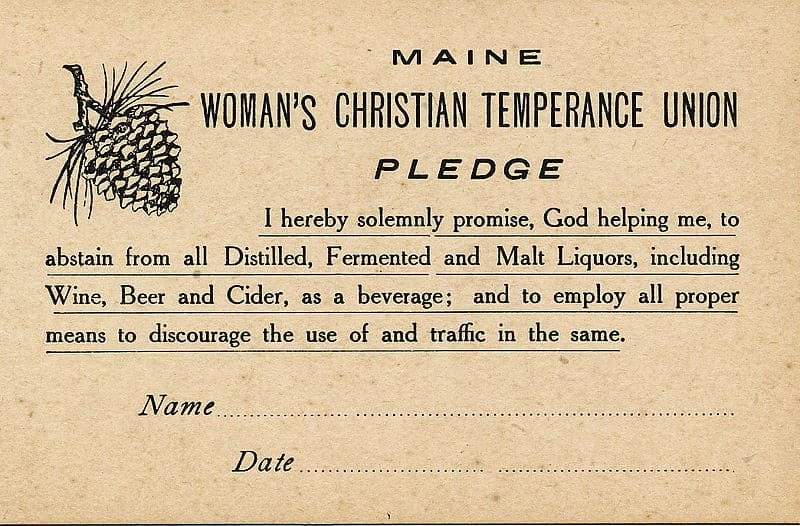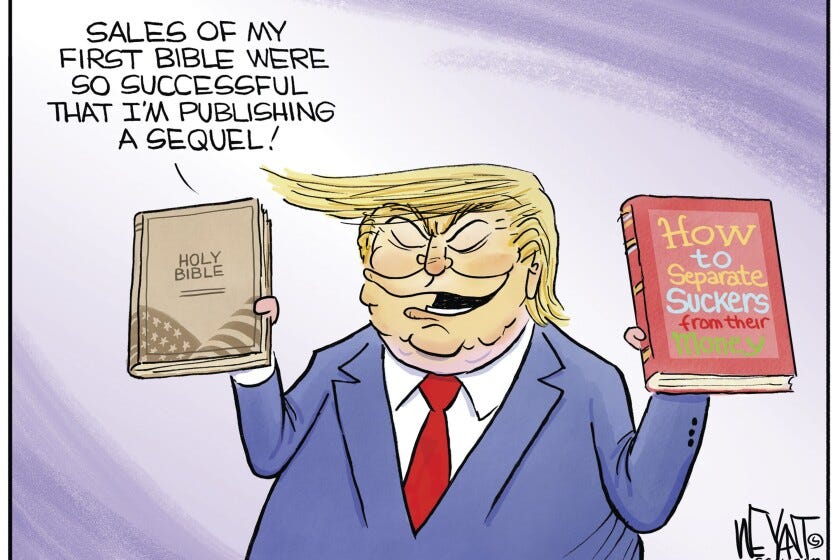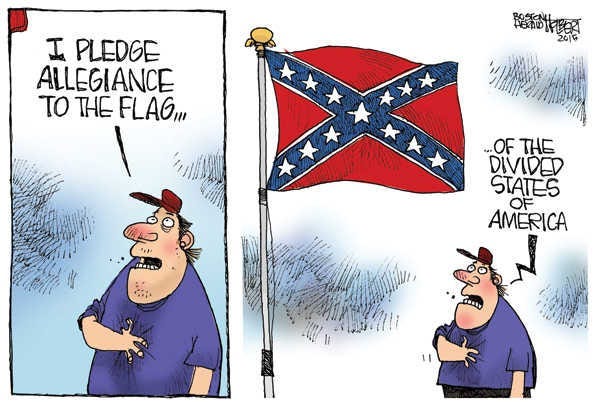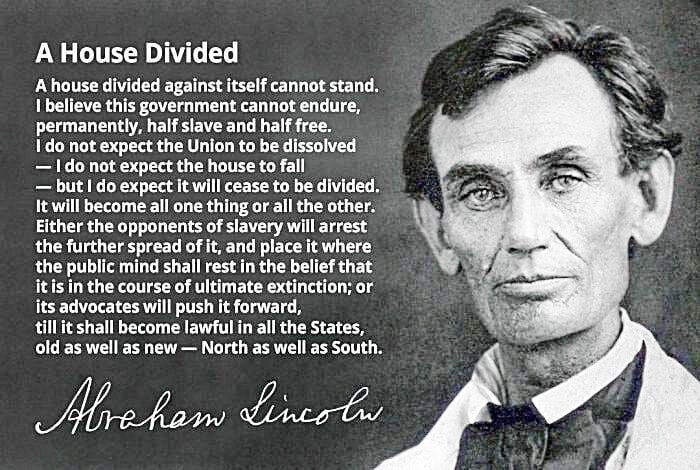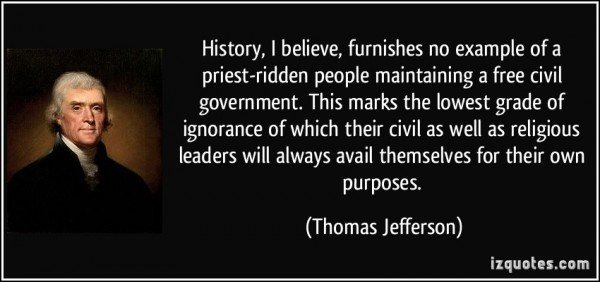Prohibition's abysmal failure provides insights into what MAGA's Christian Nationalism will do to our nation.
Don't Republicans read the constitution?
TAT readers,
Well, here we are, another Monday is upon us. I hope that all of you found some relief and peace from our current national chaos over the weekend. Today is another essay built around an insightful part of US history, Prohibition. It is insightful, because tells us of the failure of allowing any political movement, to base their ideology around a specific religion, and then impose it on the entire nation. This is about as un-American as it gets and decidedly, unconstitutional. One of the most dangerous elements of the MAGA movement, is that it is built around an aberrant form of Christianity called Christian Nationalism, which is roundly condemned of by all major, US Protestant churches, including the NCC, the National Council of Churches.
"From the foundation of the United States, Christian nationalism has traditionally employed images that advocate an idealized view of the nation’s identity and mission, while deliberately ignoring those persons who have been excluded, exploited, and persecuted, such as Native Americans, enslaved African Americans and their descendants, and a cascading procession of others, including, e.g., the Irish in the 1840s-50s, Chinese in the 1880s, Italians in the early 1900s, Jews in the 1930s, and Muslims in the 2000s and following. From its beginnings, the Christian nationalist movement has endorsed American exceptionalism, the idea that the U.S. is more righteous and upright than other nations, but during the last sixty years a significant number of Christian nationalists have become increasingly partisan, divisive, ideological, and militant. Christian symbols have been misappropriated, emptied of their profound meaning, and invoked to support idolatrous loyalty to the nation. For some Americans, the familiarity of the themes that Christian nationalism celebrates can obscure its true character and intentions. Nevertheless, because of the danger that it poses to our country today, identifying and consciously abjuring its malignant outlook is vitally important." - The Dangers of Christian Nationalism in the United States: A Policy Statement of the National Council of Churches - National Council of Churches - Adopted by the Governing Board April 20, 2021 (Corrected 4.22.21)
I’m not implying that Prohibition was entirely Christian Nationalist, but that imposing one interpretation of Protestantism, was the primary ideology of the Temperance movement concluding with a constitutional Amendment, that ended in abject failure. Passed in 1920, the Eighteenth Amendment or Prohibition, was so disastrous that it was repealed only thirteen years later. Those who understand the process for Amending our Constitution, know just how difficult it is to amend our foundational and defining legal framework. Two amendments in roughly a dozen years, one to act and the second to repeal, is a startling achievement.
Today’s essay will not necessarily be the long, dry, nap-inducing history lesson of our school years. It’s about reviewing the lessons we learned regarding the 18th Amendment, to what Trump and his minions are attempting to do by weaving Christian Nationalism into most government aspects of our lives.
Onward
History matters: What was Prohibition, where did it come from and why it failed?
Below I have shared four, linked sources to support my thoughts in this essay. Under each link, is a notable quote from each that provide a excellent background. History is and will always be instructive into everything that humans willingly venture into, as well as what their indifference or misguided interpretations of history provide in the way of consequences.
Our founders were mostly men of great scholarship, either by formal training such as Madison, Jefferson, Adams, etc. while that men like Washington’s and Hamilton’s scholarship, came via far more challenging paths. Both paths produced men who not only knew history, but men who learned from it. Madison, one of my favorite founders and the “father of our constitution,” had done deep research into representative governments throughout history, beginning with the Greeks, as to better understand why each had failed. He did this so as to build into our constitution, concepts that avoided the pitfalls of prior failures. That seminal research was called: Notes on Ancient and Modern Confederacies, [April–June?] 1786.
Both Madison quotes in the graphics, are strongly linked to the disastrous Eighteenth Amendment. Prohibition ushered in a far bolder and more violent wave of organized crime, that continues to plague the nation and the world. This was due to the politics of Prohibition that contributed little, if no thought towards the ramifications resulting from their religious zeal. Madison’s quote above regarding wealth or wealth at a level that I would consider oligarchical, in this case revolves around the massive, acquired wealth by organized crime, or gangsters as they were called in the era.
The “war to end all wars” was over, but a new one was just beginning—on the streets of America. It wasn’t much of a fight, really—at least at the start. On the one side was a rising tide of professional criminals, made richer and bolder by Prohibition, which had turned the nation “dry” in 1920. In one big city alone— Chicago—an estimated 1,300 gangs had spread like a deadly virus by the mid-1920s. There was no easy cure. With wallets bursting from bootlegging profits, gangs outfitted themselves with “Tommy” guns and operated with impunity by paying off politicians and police alike. Rival gangs led by the powerful Al “Scarface” Capone and the hot-headed George “Bugs” Moran turned the city streets into a virtual war zone with their gangland clashes. By 1926, more than 12,000 murders were taking place every year across America. - The FBI and the American Gangster, 1924-1938 - Official FBI website
The reason that I bring up Madison’s scholarship is that one of the most critical lessons he learned via his research, was that the dominance of any religion in representative government, was the equivalent to a death knell.
The Eighteenth Amendment and national prohibition. Part 1. Introduction - Brandeis University
“Prior to its repeal, the Eighteenth Amendment prohibited the manufacture, sale, or transportation of “intoxicating liquors” for “beverage purposes” within the United States. To enforce Prohibition, Congress enacted the National Prohibition Act or “Volstead Act.” The Eighteenth Amendment and Volstead Act were controversial in part because they empowered the federal government to police activities that implicated individual social habits and morality—a role traditionally led by state and local governments. Difficult to enforce and widely disobeyed, Prohibition lasted almost 14 years before the Twenty-First Amendment repealed it.
The Eighteenth Amendment was the product of nationwide temperance movements that first emerged in the decades after the Founding and steadily grew in influence during the Progressive Era. From the Colonial Era to the early 1800s, many Americans viewed moderate alcohol consumption as a normal aspect of life. Early Americans, including many of the Founders, drank, purchased, or manufactured large quantities of alcoholic beverages. However, as Americans’ consumption of hard liquor increased significantly from the 1790s to the 1830s, Protestant Christians, concerned about alcoholism’s effects on society, formed some of the first temperance groups.”
"Prohibition and Religion: William H. Anderson, the Anti-Saloon League" by Lionel Benavidez
“The Prohibition Era of the 1920s was a social and political condition created and designed by a nineteenth-century rural Christian Protestant crusade against alcohol. Evangelical Protestant activists took a very personal and spiritual approach to the issue of alcohol consumption and turned it into a far-reaching and long-lasting nationwide campaign aimed at changing American culture. The Prohibition Era which resulted was a brief noble experiment remembered more for its sensational news stories of organized crime, political corruption, and popular culture than for the religious crusade that produced this episode in American history. The untold story of Prohibition involves a social and political methodology used by those religious crusaders as they spread their agenda throughout America. In their single-minded pursuit to eliminate alcohol from society, these social reformers challenged the separation of church and state, manipulated the rural and urban political (and cultural) divide, and utilized an aggressive single-issue political platform to achieve their goals.”
ABSTRACT:
“Christian Nationalism and the Birth of the War on Drugs tells the story of how American Protestantism helped generate a global Drug War during the nineteenth and early twentieth centuries. Postmillennial eschatology, colonialism, white Christian nationalism, and Protestant moralities germinated the foundational elements of the Drug War within the Christian Temperance Movement. Over the course of the nineteenth and twentieth centuries, these antidrug moralities grew to become supposedly secular, universal norms, shaping private attitudes and public policy toward both addicts and narcotics. While alcohol prohibition has long since waned, the Drug War continues into the present. Instead of representing a separate, private realm of human activity, “religion” coconstituted other spheres of social life, such as law, race, and science. This overlap mattered greatly for the Drug War. Americans enamored with “the civilizing mission” hoped to “civilize” racial others who they considered inferior, often seeking to protect them from substances they thought might regress them morally. The civilizing mission overlay widely held Protestant expectations about what the Millennial Kingdom would look like, and many believed it required them to train “child races” in Euro-American culture. As the century unfolded, “the millennium” gradually came to be called “progress” instead. This shaped how missionaries and other Christians understood their work when they authored and lobbied for drug policy. Furthermore, nineteenth-century scientific norms evolved into the eugenics movement, which led many Americans to read “morality” as a medical category—immorality was an inheritable defect. This medicalized Protestant moral norms, which in turn rendered addicts “degenerates” who were permanently unfixable.”
“Sinclair's impugning’s in Prohibition: The Era of Excess (1962) are often remarkably similar to the tales of horror told by Anti prohibitionists in the 1920s: “With a terrible faith in equality,” he observes, “the prohibitionists often wanted to suppress in society the sins they found in themselves” (pp. 26–27). He quotes G. K. Chesterton approvingly: “When the Puritan or the modern Christian finds that his right hand offends him he not only cuts it off but sends an executioner with a chopper all down the street, chopping off the hands of all the men, women and children in the town. Then he has a curious feeling of comradeship and of everyone being comfortably together.” Sinclair goes on: “It was in this wish to extend their own repression to all society that the drys felt themselves most free from their constant inward struggle. Indeed, they defended their attacks on the personal liberty of other men by stating that they were bringing these men liberty for the first time.”
Hopefully, I haven’t worn you out with this highly abbreviated history lesson. The points though are clear and in the numbered points below. Don’t forget that most of Trump’s life has included the very same types of organized crime influences, that was produced by Prohibition. He runs his life and our nation now via mob principles, while concurrently using Christian Nationalism as the ideology that keeps his GOP crime family unified against our constitutional republic. As we can see from today’s story, such distinct deviances from our constitutional principles, are acute threats to the American people and our system of governance.
Our Civil War, 1861-1865, just like today’s MAGA GOP, was one such threat. The attempt of the Confederacy to secede from our Union, was largely based on the same ideology and actions I have previously discussed as, The Four Horsemen of the MAGA Apocalypse, Autocracy, Oligarchy, White Christian Nationalism and Violence. Abraham Lincoln was right when he delivered his “A House Divided” speech, and his words are as prescient today as they were in 1858 when he first uttered them.
The Confederacy, like MAGA is today, was explicitly unconstitutional. The MAGA GOP, operating exclusively now on the 180-day playbook from Project 2025 is the same. A primary intent of Project 2025, is to make Christian Nationalism, the national religion. Either the MAGA Republicans will win and change our nation into their immoral and unconstitutional version of the legitimate republic we all know and love, or we, those who believe in our founding principles and the constitution that so eloquently and clearly outlines those principles, will prevail. The current situation will like Lincoln said, not endure. I will stand for honoring our founders, not the fake patriots of Trump and his Party. I hope and pray that all Americans of any political persuasion or religious beliefs, will defend her too.
Religion has no say, in the laws of our nation.
Politicians that pursue, support or remain silent on the unconstitutional invasion of religion into governance, are breaking their sworn oath to the nation.
Failure to consider the consequences of religious or any unconstitutional movement’s impacts on our nation, undermines our national values and produces disastrous outcomes
If you have made it this far in today’s history lesson, I am beyond grateful. From my perspective, the best way to defeat what Trump, MAGA and their GOP is imposing on all of us, is to simply stand firm on our true principles of being American. Sure, they are marketing a rebranded version of fake patriotism, but it can’t hold a candle to the real thing, that has endured centuries catastrophes and headwinds. True resilience can only be achieved with moral beliefs, not extremist ideologies. When I write about our history, my intent is simply to build resilience in who we are as Americans. Like the Confederacy, MAGA can’t stand up to what our nation truly represents, no matter how unscrupulously, immorally or dishonestly they try.
My very best for your week,
Paul


